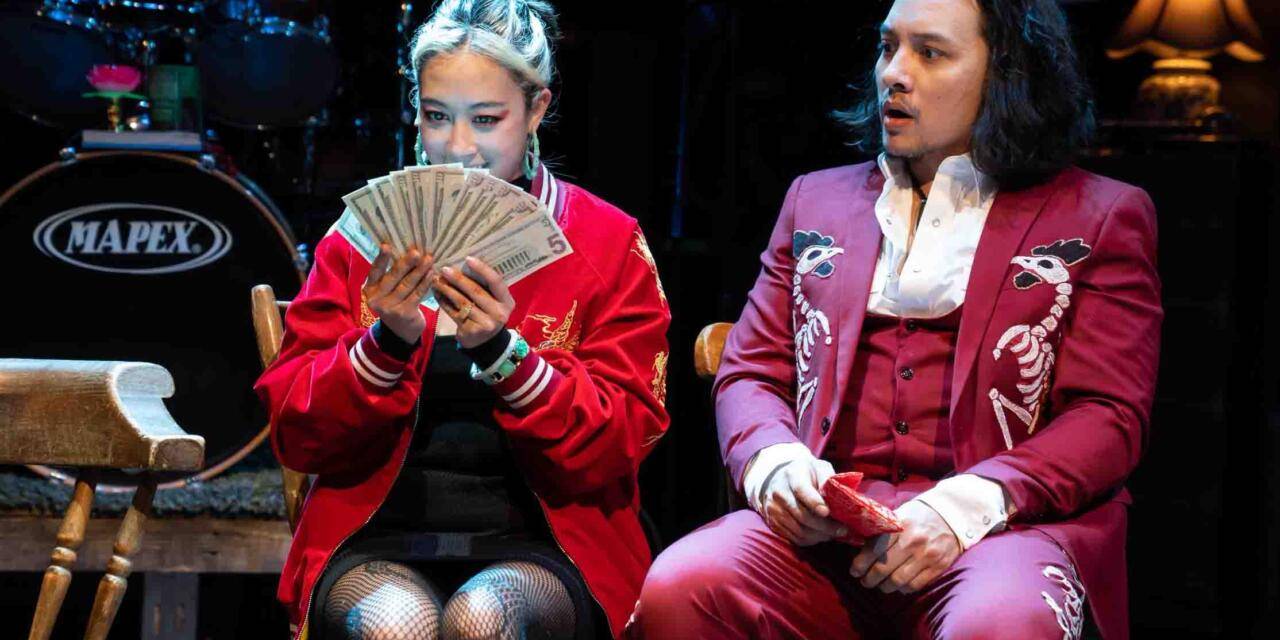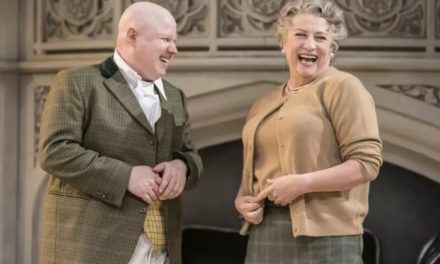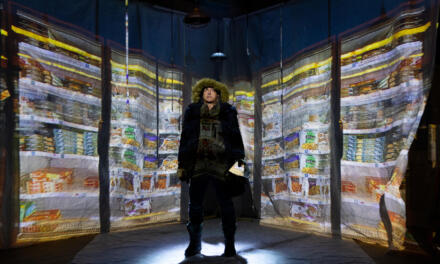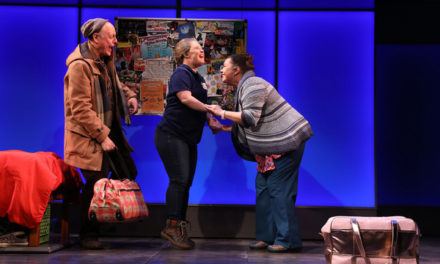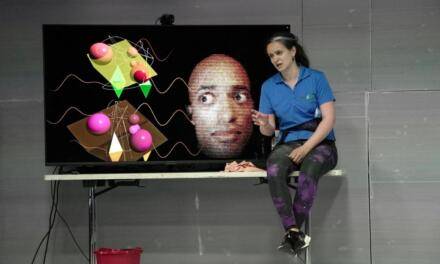For Part I of the interview, click here.
Susanna: The play deals with the Asian American topic, with the renegade idea itself and then countryside music. There’s the sense of rebellious spirit and freedom to it but also in a sense the outlaw. At the end of the play, how does this concept where bad people can be good people relate to how Asian Americans are countering the model minority stereotype, breaking free from or counteracting that?
Matthew: I think a lot of Asian Americans, including myself, encounter at certain times a pressure to conform to a certain identity, whatever the general culture views you as in America. You might think that that applies to you, but that’s just an oversimplification because everybody’s a complicated person who has their own flaws and virtues. And there’s all this stuff that makes you a human being that can’t just be broken down into you’re an Asian American. You know what I mean? But I think a lot of us have felt that pressure. And so this show is a response to that pressure where Lucy and Charlie both felt the weight of the myth of the model minority on them and the right or wrong made it a conscious decision or I guess unconscious decision to a certain extent to rebel against it. And they do it in the most disruptive way possible. It was really a response to my experience growing up as an Asian American. I think that’s my answer.
Susanna: I like that complexity of the characters’ setting and encounters kind of paralleling the complexity of the Asian Americans as human beings.
Matthew: Totally. That it’s all complicated no matter who you are.
Susanna: So you grew up half Chinese?
Matthew: Yeah, my dad is first generation Chinese and my mom is Scottish first generation.
Susanna: And are there specific moments in a play where it exactly happened, you know, these inspirational segments?
Matthew: Yeah, I didn’t really dive into the whole challenge of being “hapa” or mixed Asian. That’s a totally different challenge than being all Chinese American and something that I want to write about in the future. My dad was Chinese American, and my mom is white with a very strong Scottish heritage in my mom’s side of the family. A lot of the story was inspired by my father’s experience rather than my own. His parents were from China and he grew up in the early eighties, late seventies and really just wanted to be as American as he possibly could. It was an alienating experience being Chinese American back then. And a huge challenge. And he dealt with a lot of racism and discrimination growing up. I think this happens a lot in Asian American immigrant families, the first generation born there tries desperately to be as American as they can. But in doing that, you end up losing some of your culture. So my generation, the ones that came after [first-generation Americans] are then stuck with this challenge of trying to regain some of that culture. So, you know, our options are to go to our elders and try and learn as much as we can, but you have limited time now because they’re getting older and so on. The story was definitely heavily based on what I perceive my father’s experience to be.
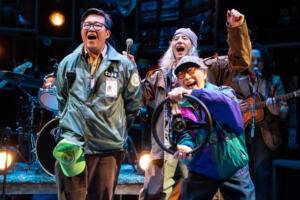
Lucy and Charlie’s Honeymoon. Rammel Chan, Daniel Lee Smith, Wai Ching Ho. Photo by Liz Lauren.
Susanna: Have you always felt the need to find your roots? Do you think first-generation Asian Americans should be going back to their traditions?
Matthew: I think that we need to create a culture and society–and we are–where people are much more open-minded now. All cultures are much more accepted now. We have a much more integrated society now than we did, like when, the 1950s through like, you know, I mean, it’s better now for a lot of different communities in America. So, I think it’s not about going back, it’s about being okay with being who you are as an American. Your family came here for a reason–they were looking for a better life. That doesn’t mean you have to erase who you were before or who your ancestors were. It’s about finding a way to embrace both sides of that, embrace this complicated mess of different cultures and come together as one.
Susanna: And then at the end that’s the message that you hope to send at the very end of the play as well.
Matthew: Yeah, totally. Our last images are the traditional weddings, and tea ceremonies, which Charlie and Lucy decided to do because they were trying to embrace part of their heritage, but then Bao has her important cultural moment within the context of the American outlaw West moment that she so desires.
Susanna: You call the play musical, but then no one is really belting in the typical Broadway style.
Matthew: So I was trying to create a musical that was really accessible for people that weren’t belters or weren’t career singers in that way. I wanted the music to be simple enough that we could cap it from a wide variety of Asian American actors, musicians. The big challenge is the musicianship part because that can get complicated. If you’re going to play like a band, you have to be able to communicate. It’s something that you need to have experience doing to play music together because it’s the most extreme form of ensemble work out there. Most of the folks aren’t professional musical actors, but a lot of them are musical people who play instruments.
Susanna: That’s really unique. It also helps the characters to be more authentic in expressing themselves. Something else is, you are so multi-talented. I wonder how you seamlessly go from one artistic medium to another, since you sing, act, write music, make films, play instruments, and all that.
Matthew: Yeah, I just like making things in general. I think my one talent is that I can make things. So I try to apply the same mentality towards everything, which mainly means you need to be patient and you need perseverance. You can’t be frustrated when you’re not good at it right away. Something that I’m pretty good at is being okay with being bad at stuff for a while. So I think that’s, I’ve been trying to figure that out, like why I do like to do so many different things and I think it’s that it brings an enjoyable challenge for me to figure things out. That’s my favorite thing in the world to do, for instance, learning a new instrument or learning a new craft. There’s also a book called Big Magic. And it’s a book about creativity. And one of the things the writer talks about is this phenomenon called the arrogance of belonging. And the arrogance of belonging is like this belief that you belong in any room that you walk into. And it sounds like a negative thing but it’s actually not. If you’re gonna be good at anything, you have to believe that you can do it in the first place, even if it’s really silly, you know, like an over-the-top thing that you may not ever be good at, but believing that you can do it is like the first step in doing anything.
Susanna: So would you say you’re always a very confident person?
Matthew: I try to be at least in a creative space. I try to be as confident in myself as I possibly can while still being reasonable. You have to, of course, listen to everybody that is better at what you’re doing than you are. One of the best ways to learn something is to be in a room with people who are better at it than you are.
Susanna: Your self-confidence also applies to the courage to overcome challenges and problem-solving and being really practical.
Matthew: Totally, yeah. It’s an important skill to hone, right? It’s all about believing in the thing that you’re doing and trusting your own voice and your own skills and knowledge.
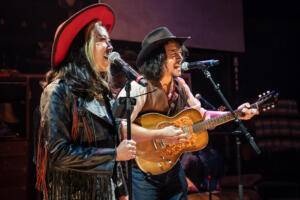
Aurora Adachi-Winter and Matthew C. Yee. PC: Lookingglass Theatre.
Susanna: We say this is the world premiere of Lucy and Charlie’s Honeymoon. Where do you imagine it to go? What type of scale do you imagine and what sort of impact, especially within the Asian American community, do you hope or envision it to have in the long run?
Matthew: I want to take it to as many theaters as we can. I want to take it to the West Coast. I want to take it to New York. I want to take it to Broadway if we can. I mean, that’s the ultimate goal is to have a really cool, fun Asian American musical on Broadway. So that’s the ultimate goal – I want to share it with more people.
This post was written by the author in their personal capacity.The opinions expressed in this article are the author’s own and do not reflect the view of The Theatre Times, their staff or collaborators.
This post was written by Susanna Sun.
The views expressed here belong to the author and do not necessarily reflect our views and opinions.

